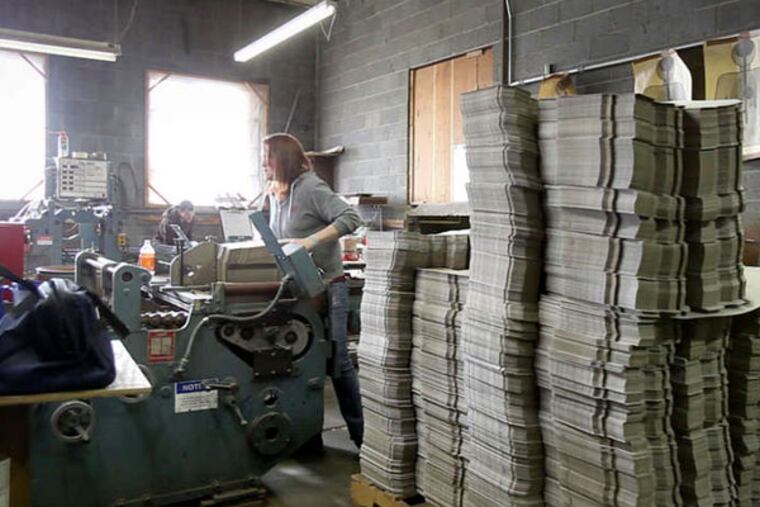Continuing to refocus his business model
PLAINS, Pa. - As you pay a bill online rather than mail it, or give a present in a gift bag instead of a wrapped box, know that David Frank suffers.

PLAINS, Pa. - As you pay a bill online rather than mail it, or give a present in a gift bag instead of a wrapped box, know that David Frank suffers.
He is president of Midvale Paper Box Co. Inc., headquartered at his Haverford home. The actual manufacturing is done in a factory built in 1954 in Plains, a Luzerne County town of 4,300 residents just outside Wilkes-Barre.
There Frank, 53, has endured two "implosions" since he bought the plant in 1999 - all the while doing what small manufacturers have to do to survive, he said: investing in employee training.
"If you don't train, you can't expand," he said.
Midvale was closed at the time Frank bought the plant, the owner having died and his eight children with their own professional careers - seven doctors and a lawyer.
For Frank, the purchase was a continuation of his own family's business - his late father, Carl, along with uncles, aunts, and grandparents - had operated a box factory in Southwest Philadelphia from the 1950s to about 1990. Toward the end, disagreements and financial problems dwindled the family involvement to just Frank and his father.
Having graduated from the University of Pennsylvania with a business degree in 1982, Frank would leave Majestic Paper Box Co. three years later to start a Center City package brokering business.
He sold that business, Integrated Manufacturing, in 1997 and was in the process of "developing something in the financial market" and "on the way to broke," he half-joked, when he heard the Midvale plant was for sale.
The allure, he said, was having "a chance to rebuild a business in my own image."
That he would be starting with nothing didn't scare him.
"When you're so small, there's only one way to go - up," Frank said. "All you need is a few good accounts and you're on your way."
So he started making phone calls to accounts he once serviced for his father. A big break would come from one of them, an envelope manufacturer in Schuylkill County. By 2004, Midvale was the second-largest producer of envelope boxes on the East Coast, Frank said.
"I had five warehouses," he said. "We were doing pretty good, and then it imploded. That was like a slow death, over a period of six years, when faxes started to come into play. That began the downward spiral. And then the Internet kind of put the nail in the coffin."
It would be the second bottoming out of a promising revenue niche. The other had been apparel gift boxes, a sector that had begun to collapse when Frank's father was still in business and department stores started disappearing from the landscape. Those who stayed in business stopped offering customers gift boxes except around Christmas.
Frank lost most of the gift-box work he had been able to secure for Midvale - to China - in 2006, shutting down a production line of 15 people working two shifts, he said.
Two years later, when the economy collapsed, Midvale's staff - as large as 50 employees in 2005 - consisted of just nine employees.
"We lost two-thirds of our business," Frank said, declining to disclose the company's revenues. Midvale has been profitable from the start by keeping costs down and efficiencies high, he said. Employees in the nonunion factory are paid from $8.25 to $25 an hour.
With gift- and envelope-box sales a whisper of what they once were, Frank took Midvale in a different direction: bakery and pizza boxes. That was accomplished through the 2011 acquisition of a Baltimore company, which brought so much business, Frank had to turn some away to serve the customers who helped him get Midvale off the ground: envelope suppliers.
"You have to be willing to turn away business to stay in business," said Frank as he fast-walked through his factory last week, showing off $1.5 million in technology and machinery investments, and clusters of printing and dye-cutting press operators in training.
One new addition in particular - a central impression press - will enable the company to take on higher-volume, higher-graphical, more lucrative consumer packaging jobs such as cereal boxes and cigarette cartons. Frank expects to add a second shift in 2014, and to grow Midvale's revenues nearly 25 percent in the next 12 months or so.
Midvale's willingness to adjust has kept Jon Liss a happy client for nearly six years. He owns Michel's Bakery, a family-owned wholesale producer in Northeast Philadelphia since 1898.
"If I have a need, he'll go out and support that need," Liss said of Frank. "He'll even go out and buy equipment."
Frank said that strategy involves selling out the production lines prior to any capital outlay.
"As long as we have sales agreements in advance of equipment acquisition, I'm willing to invest," he said.
That brings us to worker training - an investment Frank says is essential to survival and costs him $30,000 per employee (counting time spent and wasted materials). He is furious the state is not providing more funding for companies to do it.
"Skilled labor is very, very hard to find," Frank said.
He wants to build a training facility for the state, but isn't ready to go into details. Stay tuned.
>Inquirer.com
David Frank talks about Midvale Paper Box Co., a small manufacturing business in Luzerne County with roots stretching back to Philadelphia.
www.inquirer.com/businessEndText
215-854-2466